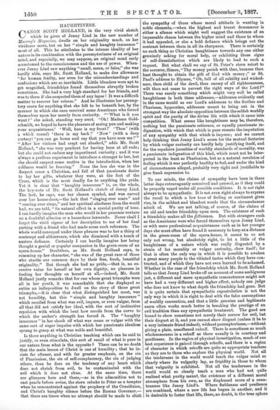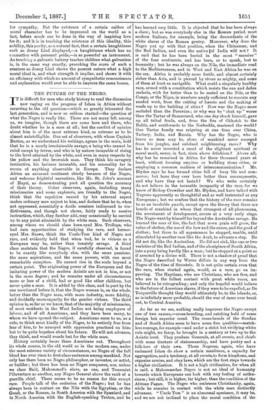HAUGHTINESS.
CANON SCOTT HOLLAND, in the very vivid sketch which he gives of Jenny Lind in the new number of Murray's Magazine, dwells on her originality much, on her vividness more, but on her "simple and haughty innocence" most of all. This he attributes to the intense ideality of her nature in its combination with the peremptoriness of an original mind, and especially, we may suppose, an original mind early accustomed to the consciousness and the use of power. When. ever Jenny Lind saw anything "small, mean, or false," she was hardly able, says Mr. Scott Holland, to make due allowance "for human frailty, nor even for the misunderstandings and oonfusions which are so inevitable. Little blunders were apt to get magnified, friendships found themselves abruptly broken sometimes. She had a very high standard for her friends, and woe to them if she suspected them of any lapse ! It was a difficult matter to recover her esteem." And he illustrates her peremp- tory scorn for anything that she felt to be beneath her, by the manner in which she once received some Americans who forced themselves upon her merely from curiosity. " ' What is it you want ' she asked, standing very erect. ' Oh! Madame Gold- schmidt, we hoped to have the pleasure of seeing yon and making your acquaintance." Well, here is my front!" Then ' (with a whisk round) 'there is my back!' ' Now ' (with a deep curtsey) 'you can go home and say that you have seen me!" "After her visitors had crept out abashed," adds Mr. Scott Holland, "she was very penitent for having been at all rude; but she could not endure any impertinent curiosity ; and it was always a perilous experiment to introduce a stranger to her, lest she should suspect some motive in the introduction, when her coldness would be freezing." None the less she was in the deepest sense a Christian, and full of that passionate desire to lay her gifts, whatever they were, at the foot of the Cross, which is the most deadly foe to anything like pride. Yet it is clear that "haughty innocence" is, on the whole, the key-note of Mr. Scott Holland's sketch of Jenny Lind. The lark, he says, was her chosen symbol, and was carved over her house-door,—the lark that "singing ever soars" and " soaring ever sings," and her spiritual aloofness from the world had, we are told, "its natural effect in a special purity of tone. Jean hardly imagine the man who would in her presence venture on a doubtful allusion or a hazardous innuendo. Never shall I forget the vivid vigour of her description to me of her final parting with a friend who had made some such reference. The whole world conveyed under these phrases was to her a thing of contempt and abhorrence, which she dismissed with a touch of austere defiance. Certainly I can hardly imagine her being thought a genial or popular companion in the green-room of an opera-house." Doubtless, as Mr. Scott Holland Bays, in summing up her character, "she was of the great race of those who startle our common days by their free, fresh, beautiful originality." But though she had no pride,—that is, no ex- cessive value for herself or her own dignity, no pleasure in feeding her thoughts on herself at all,—indeed, Mr. Scott Holland justly remarks that for one whose great triumphs were all in her youth, it was remarkable that she displayed so entire an indisposition to dwell on the story of those great triumphs,—it is clear that what distinguished her most, was not humility, but this "simple and haughty innocence" which recoiled from what was evil, impure, or even vulgar, from all that did not satisfy her ideal, with the sort of instinctive repulsion with which the bent bow recoils from the curve to which the archer's strength has forced it. The "haughty innocence " in her shook off what was mean or vulgar with the same sort of eager impulse with which her passionate idealism sprang to grasp at what was noble and beautiful.
Is there anything in Christian teaching which can be said to justify, or even stimulate, this sort of recoil of what is pure in our nature from what is the opposite P There can be no doubt that the main lesson of Christ is one of humility ; that he in- sists far oftener, and with far greater emphasis, on the sin of Pharisaism, the sin of self-complacency, the sin of judging others, than he does on the tendency of any heart which does not shrink from evil, to be contaminated with the evil which it does not shun. At the same time, there are glimpses here and there,—as in the admonition not to cast pearls before swine, the stern rebuke to Peter as a tempter when he remonstrated against the prophecy of the Crucifixion, and Christ's haughty silence before the Roman Governor,— that there are times when no attempt should be made to elicit
the sympathy of those whose moral attitude is wanting in noble elements,—when the highest and truest demeanour is either a silence which might well suggest the existence of an impassable chasm between the higher mind and those to whom it had appealed, or else a bold defiance which brings out the contrast between them in all its sharpness. There is certainly no such thing as Christian haughtiness towards any one either genuinely asking for moral help, or exhibiting those signs of self-dissatisfaction which are likely to lead to such a request. But what shall we say of St. Peter's stern retort to the sorcerer, Simon," Thy money perish with thee, because thou haat thought to obtain the gift of God with money ;" or St. Paul's address to Elymas, "Oh, full of all stibtilty and wicked- ness, thou child of the devil, thou enemy of all righteousness, wilt thou not cease to pervert the right ways of the Lord P" There was surely something which might very well be called haughtiness in both these addressee,—addresses evidently cast in the same mould as our Lord's addresses to the Scribes and Pharisees, hypocrites, addresses meant to bring out in the strongest way the absolute opposition between the selfish worldly spirit and the purity of the divine life with which it came into competition. What seems like haughtiness may be, therefore, nothing but the passionate reticence, or equally passionate in- dignation, with which that which is pure resents the imputation of any sympathy with that which is impure ; and we cannot help thinking that Jenny Lind's scorn for the mutual flatteries by which vulgar curiosity can hardly help justifying itself, and for the repulsive jocosities of worldly standards of morality, was a passionate indignation of this kind, which must not be inter- preted in the least as Pharisaism, but as a natural revulsion of feeling which it was perfectly healthy to feel, and under the kind of circumstances alleged, probably very right and justifiable to give frank expression to.
To our minds, the claims of sympathy have been in these latter days extravagantly conceived and pressed, as if they could be properly urged under all possible conditions. It is not right always to be sympathetic. It is not even right always to express the recoil to which a kw tone of feeling or sentiment gives rise, in the mildest and blandest words that the circumstances admit of. We are not talking, of course, of the claims of an old and tender friendship upon men. The existence of such a friendship makes all the lifference. But with strangers such as the Americans were who forced themselves upon Jenny Lind, or with mere professional acquaintances such as in her younger days she must often have found it necessary to keep at a distance in the green-room of the opera.honee, it seemsi to us not only not wrong, but absolutely right, to let a little of the haughtiness of a nature which was really disgusted by a strain of lax morality or vulgar curiosity, show itself; for that is often the only way in which it is possible to awaken a great many people to the vitiated tastes which they have con- tracted, and of which they have not even learned to be ashamed. Whether in the case of the friendship which Mr. Scott Holland tells us that Jenny Lind broke off on account of some ambiguous jest, a different and more sympathetic remonstrance might not have had a very different and higher effect, nobody can judge who does not know to what depth the friendship had gone. But it is quite certain that sympathetic expostulation is not the only way in which it is right to deal with the false assumptions of worldly convention, and that a little genuine and legitimate scorn often works much better in breaking the prestige of an evil tradition than any sympathetic treatment. The good are bound to show sometimes not merely their sorrow for evil, but their disgust at it, and you cannot show disgust (unless it be to a very intimate friend indeed), without peremptoriness,—without giving a plain, unsoftened rnbuff. There is sometimes as much wholesomeness in a rebuff as there usually is in courtesy and gentleness. In the region of physical investigation, much of our best experience is gained through rebuffs, and there is a region of character in which rebuffs are quite as appropriate teachers as they are to those who explore the physical world. Not all the tenderness in the world would teach the vulgar mind so clearly where its vulgarity lay, as frigidity in those to whom that vulgarity is exhibited. Not all the tenderness in the world would so clearly teach a man who had not quite realised what purity meant, the existence of a different moral atmosphere from his own, as the displeased scorn of a coun- tenance like Jenny Lind's. Where feebleness and penitence are combined, where a new life has begun in another, and it is desirable to foster that life, there, no doubt, is the true sphere
for sympathy. But the existence of a certain calibre of moral character has to be impressed on the world as a fact, before much can be done in the way of inspiring love for it; and it is in teaching the existence of this ideality, this nobility, this purity, as a natural fact, that a certain haughtiness such as Jenny Lind displayed,—a haughtiness which has no connection with personal pride,—is so powerful an instrument. As touching a galvanic battery teaches children what galvanism is, in the same way exactly, provoking the scorn of such a creature as Jenny Lind shows the poorest nature what a high moral ideal is, and what strength it implies, and shows it with an efficiency with which no amount of sympathetic remonstrance and explanation would ever be able to impress the same lesson.










































 Previous page
Previous page